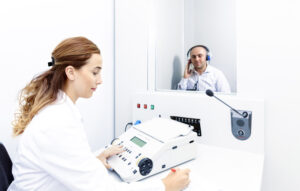Audiologists help hundreds of thousands of Americans identify and fix hearing problems every year in the United States. According to the National Institute on Deafness and Other Communication Disorders, around 15 percent of American adults report some hearing difficulty. And two or three out of every thousand children have some level of detectable hearing loss in one or both ears.
Together with speech-language pathologists, audiologists also deliver critical assistance to people who have speech and swallowing impediments.
Watching the wonder light up a toddler’s face as their cochlear implants fire up for the first time and deliver the new experience of sound is both incredibly satisfying and noble work.
But becoming an audiologist takes years of study and tremendous dedication. Choosing between audiology and speech pathology can be tough. Both professions work with many of the same patients. And becoming a speech language pathologist is a faster option if you are eager to get started.
Audiology is a particularly lucrative and satisfying field for anyone interesting in working with the hearing-impaired, however. You owe it to yourself to learn more about how to become an audiologist before you make your final decision.
How Do You Become an Audiologist?
Requirements to become an audiologist in the United States are strict. Although audiologists are not doctors, they have to earn a doctoral degree. They face strong licensing requirements in every state. And they are expected to meet the high standards of national certification in the field to keep up with the technical and medical challenges they face on the job.
Those factors all add up to a long and arduous process in order to finally become a practicing audiologist. If that’s your path, you’ll have to follow the 5 steps below to get there.
How hard is it to become an audiologist?
To become an audiologist, you have to go through a long period of education that culminates with a Doctor of Audiology degree, before going on to pass a rigorous national test and meeting strong state requirements for licensure. Most audiologists also become certified in the field, which adds another layer of qualifications and proof of experience.
How many years does it take to become an audiologist?
You can expect to spend at least eight years in school before you are eligible to become an audiologist. But even after you have finished your education, you will need to pass the critical national test for licensure and meet your state’s requirements before you can begin practice, so nine or ten years is not uncommon.
What education do you need to be an audiologist?
Audiologists must earn at doctoral degree in the field in order to become licensed and certified. That requires a four-year bachelor’s degree followed by four years in a doctor of audiology program. Your coursework will take you through subjects such as:
- Audiologic assessment
- Medical issues affecting hearing
- Clinical counseling
- Professional ethics
Step 1: Earn a Bachelor’s Degree
 You have to get a doctorate eventually, but that means first earning a bachelor’s degree.
You have to get a doctorate eventually, but that means first earning a bachelor’s degree.
Your best start down the path to a career in audiology, of course, will come through audiology undergraduate programs. They will give you the right basis of education to succeed as you go on to your AuD.
These are usually offered as a bachelor of arts or science in audiology and speech language sciences. That means they deliver not just the right preparation and training for audiologists, but also for speech-language pathologists.
That means you have a lot of flexibility if you are still undecided about the long period of intensive training required for a career in audiology. You have a chance to go in another direction after your first four years of study. At the same time, a BASLP gives you the kind of insights into speech-language pathology that are valuable as an audiologist. You’ll understand the kinds of therapies and diagnostics that will be most helpful to a profession you will certainly end up working closely with in the long run.
Step 2: Earn an Doctoral Level Audiology Degree
Even if you earn a bachelor’s degree, the real meat of your training as an audiologist comes through your AuD: Doctor of Audiology.
For this rigorous four-year program, you will want to select only from universities that have been accredited by ASHA, the American Speech-Language-Hearing Association. ASHA is the specialty accreditor that determines what the professional standards are in the field of audiology, and their stamp of approval is a must-have if you want to get licensed or certified as an audiologist anywhere in the country.
To do that, you’ll spend four years in courses such as:
- The physics of sound and acoustic and psychoacoustic phenomena
- Speech science
- Electronics, instrumentation, and calibration
- Anatomy and physiology of hearing
- Clinical diagnosis of auditory disease
- Auditory training
- Rehabilitation and audio devices
You’ll also go through extensive clinical placements and experience, spending time in hospitals, clinics, and community services agencies learning how to put your training into practice.
Ready to become an audiologist? Find an accredited audiology graduate program near you!
Step 3: Become Certified as an Audiologist
 The first thing you are going to want to do after graduating with your AuD is to do a lot of drinking and probably fly off to Cabo for a while. But what you should be doing is hitting the books again.
The first thing you are going to want to do after graduating with your AuD is to do a lot of drinking and probably fly off to Cabo for a while. But what you should be doing is hitting the books again.
That’s because graduating from that ASHA-accredited program was just step one in another micro-six-step process that will end up granting you the coveted CCC-A from ASHA: the Certificate of Clinical Competence-Audiology. And step two is passing the Praxis examination in audiology.
The exam is a computer-based, 120-question, multiple-choice test that covers five sections of audiology knowledge:
- Foundations
- Prevention and Identification
- Assessment
- Intervention
- Professional Issues
The exam is used by ASHA for the CCC-A requirements, but also by states in their licensing process, so you are really hitting two birds with one stone by taking and acing it. ASHA and each individual state have their own standards for passing scores, however.
The CCC-A also requires that you have a certain amount of supervised practicum hours of clinical experience under your belt, but doesn’t specify how many. Instead, the certification accepts the accreditation standards for your doctoral program as being adequate for direct clinical practice.
Professional Certification Continues Through Your Career as an Audiologist
Although this is just step 3 on a longer list of steps explaining how to become an audiologist, you’ll find that certification keeps coming up throughout your entire career in the field.
Many states accept the CCC-A itself as fulfilling most of their licensing standards, so you will find the next step easy going in your overall progress toward a job in audiology.
The American Board of Audiology also offers audiologist certification, but rather than use the test as a standard, it requires 2,000 hours of mentored professional practice on top of your doctoral degree. Although you don’t need state licensure to get your ABA certification, you will have to submit proof of it within a year of applying. A handful of states accept ABA certification as fulfilling licensure requirements in the same way the CCC-A is accepted, but the circular nature of the process makes it less common.
But ABA has other specialty certifications that you might choose to pursue for professional reasons long after you have met your licensing requirements. These offer employers and clients even more assurance of your skills in hot areas of practice that require additional expertise. They include:
- Pediatric Audiology Specialty Certification
- Cochlear Implant Specialty Certification
- Certificate Holder-Audiology Preceptor
- Certificate Holder-Tinnitus Management
Step 4: Meet Audiologist Requirements for Licensing in Your State
Each state requires audiologists to be licensed to practice. All of them have established professional boards to regulate the licensing process. Those boards set the standards and evaluate applicants to decide whether or not they should receive a license, and to handle disciplinary and malpractice matters. It’s worth checking out audiology licensing requirements by state in order to see what your qualifications will need to be.
Though the information we feature is strictly related to SLP licensure, the state boards listed here will provide all the information you need on audiology licensure requirements by state.
As noted, holding a CCC-A is almost a lock on getting licensed in most states. The Praxis exam you took for that process is generally a requirement no matter what, so it was time well-spent even if you didn’t need the CCC-A.
You may also have to take and pass a state-specific exam regarding jurisprudence or professional practice. And you usually have to fulfill around 2,000 clock hours of supervised clinical experience.
Just getting a license isn’t enough, however. Once you earn it, you will have to maintain it by getting a certain number of continuing education hours before each renewal period comes up. This often happens on a two-year cycle, and requires between 30 and 40 hours of classes, seminars, or conference attendance to make sure you are keeping up with the latest developments in the field. Since this is also a requirement to maintain the CCC-A and ABA certification, you are once again taking care of two tasks at once.
Step 5: Get a Job as an Audiologist
 Audiology jobs are expected to increase at a rate faster than average between 2019 and 2029. The Bureau of Labor Statistics (BLS) forecasts that the increase will be about 13 percent during that period, which beats the 4 percent overall growth rate for most jobs.
Audiology jobs are expected to increase at a rate faster than average between 2019 and 2029. The Bureau of Labor Statistics (BLS) forecasts that the increase will be about 13 percent during that period, which beats the 4 percent overall growth rate for most jobs.
The reasons for the boom are not rocket science: an aging Baby Boom population spent too many years blasting Rolling Stones songs at unreasonable volumes and are starting to pay the price with failing hearing. The aging population is a blank check for audiology positions, with Boomers looking for expertise and technology to get them off the hook for their mis-spent youth.
And you can expect to get paid good money for all those years you spent in the classroom, too.
Do audiologists make good money?
According to 2020 data from the Bureau of Labor Statistics, the median pay for audiologists in the United States was $81,030. But that is just a mid-point. With better training and more experience, you can start climbing the salary ladder quickly. Those in the top ten percent of the profession make more than $128,160 per year.
- Emerson College - Master's in Speech-Language Pathology online - Prepare to become an SLP in as few as 20 months. No GRE required. Scholarships available.
- Arizona State University - Online - Online Bachelor of Science in Speech and Hearing Science - Designed to prepare graduates to work in behavioral health settings or transition to graduate programs in speech-language pathology and audiology.
- NYU Steinhardt - NYU Steinhardt's Master of Science in Communicative Sciences and Disorders online - ASHA-accredited. Bachelor's degree required. Graduate prepared to pursue licensure.
- Pepperdine University - Embark on a transformative professional and personal journey in the online Master of Science in Speech-Language Pathology program from Pepperdine University. Our program brings together rigorous academics, research-driven faculty teaching, and robust clinical experiences, all wrapped within our Christian mission to serve our communities and improve the lives of others.
